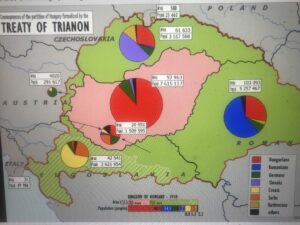I remember the impression of the Hungarian Miklos Jancso movie “Horse Army”, according to the Italian title from Babel novel, which synthetize so well the strong and unique Hungarian character. Probably Mongols people coming by horses in Central Europe, surrounded by Slavic population, with some heritage of Roman Empire in Romania, they kept on their nomadic and exploring capabilities, converting them in curiosity and technical competencies, on a basis of fierce dignity and competitiveness with neighbours. Origins, mindsets, language produced a unique cultural mix, deeply rooted in Christian values from Stephan first martyr on. The country, magnificent fertile plain centred on the Hungarian sea, the Balaton immense lake, lost the Carpatian mountains on the East to Rumania, the left side of Danube river to Slovakia, where in Poszoni, now Bratislava, the great king Mattia Corvino was crowned in 1468. They lost Rieka harbour on Adriatic Sea and the upper part of Serbia, through the diktat of Trianon treaty in 1918: in total 67% of territory and 59% in population have been lost in the two world war, due to alliances with Austria and Germany. These memories don’t disappear. and also the new generations are very proud of them and preserve language and culture through separate school in the old territories under other nations, very active in Slovakia and Rumania, but also in Serb Voivodina.
After a dobos tart and a wonderful coffee at Gerbeaud, you can find a map of the Great Hungary for some euros in any souvenir shop of Budapest. In near Balkans any one has a dream of a Great Albania or Great Serbia or Great Bulgaria, but Hungarians lived it before the first war and tried to rebuild it in the second: occupied by Soviets they have been the first people to fight them in 1956 and to open the Iron Curtain in 1989. The present State with 10 million inhabitants is fighting for its way of living and developing through dignity and ambitious strategy of full cooperation with the major political actors in the world. Yes in EU, but connected with Russia for energy and China as terminal in Central Europe and Balkans of the new Silk Roads from Asia, attracting investments of Chinese electrical cars, keeping on digital front level, avoiding to be submerged by waves of immigrants from Balkan routes and Mediterranean ones. Its leader Mr Orban ,famous head of student association with no fear in the period of conflicts with SSSR, it’s now developing a continuous effort to a balanced geopolitical positioning in the world. The heritage of Austro-Hungarian Empire is very pivotal in this geopolitical approach, like for the near Austria neutral, civil and rich. Geographically in the center of Europe, protected by Carpatian chain from East , leveraging on its heritage and experiences, the country want to mark its contribution to defend its own interests and to European civilisation progress.
Logistically its natural duties of crossing point between East and West Europe makes of Hungary a fundamental knot of every type of infrastructural network with Russia and Asia, adding value to local firms through intense commercial relationships. Always opened to dialogue with Slovaks and Czechs, Austrian and Polish, less with Rumanians, but with Hungarians in Transilvania becoming the richest part of the country, it finds more difficult to cooperate with Italy, having sympathy, catholic roots and so common history through the Angevin family period in Naples and Budapest, because of a natural interest competition in Balkan areas, well exploited by Savoy dynastic policy there. Big mistakes have been made in Bruxelles liquidating Orban as an autocrat: great leaders are simply realistic interpreter of geopolitical structure and interest of a people, if strategy is clear in its history and dynamics.

